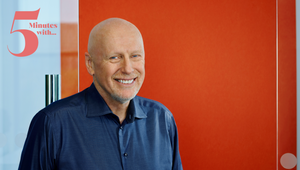
The New New Business: Finding Creative Ways of Generating Relationships with Mike Fantis

Mike Fantis is the VP and managing partner at DAC. Mike has over 15 years of experience in the marketing and advertising industry. Prior to joining DAC, Mike was a search manager at Manning Gottlieb OMD from January 2008 to December 2008. Mike was also an account manager at Latitude Group from November 2006 to December 2007, where they ran the day to day operations of the agency, including client services and new business development. Mike has also worked as a Search Marketing Manager at Ancestry.co.uk from February 2006 to September 2006, and as a Marketing Assistant at Conrad Advertising from January 2003 to December 2004.
LBB> What was your first sale or new business win?
Mike> My first ever sale I was part of was as a practitioner. The expert in the room. I think this is fairly easy as you’re showcasing your findings, areas of improvement and fresh ideas. Also, while we all want to win, it is a different pressure vs. owning the whole process.
The first major sale I made where the pitch was absolutely everything was in 2008 and was the DAC UK’s office first client. It’s always a challenge to share the vision of a new agency and this can be a gamble for the client. Despite this we showcased our knowledge and expertise and the client saw value in working the senior team directly. They felt as though the partnership would mean more to our business vs. another agency. A very proud moment but what I’m even more proud of is that the same brand is still a client today, 15 years later.
LBB> What was the best piece of advice you got early on?
Mike> You have two ears and one mouth! I know it’s a common theme but listening is everything within new business. Too many sales folk want to sell you what they have without understanding if the prospect wants or needs what they have.
LBB> And the worst?
Mike> Not sure I’ve had bad advice. What I did experience early on in my career were examples of poor team and people management and development.
I don’t think I could ever have followed their style, I love people too much. However, it was a stark example and reminder of what’s needed to be a good leader.
LBB> How has the business of ‘selling’ in the creative industry changed since you started?
Mike> Absolutely. The industry is flooded with agencies so it’s made finding an agency and supplier very difficult.
I’d add that too many sales people have not been knowledgeable enough to add value to the prospect, so lazy and often spammy looking outreach has meant prospects do not engage with outreach across the board, regardless of the content.
We have to find creative ways of generating relationships and accept the sales cycle is much longer today. If everyone accepts this then there will be no desperate sales techniques and we can start mending some of the trust issues between brands and agencies.
LBB> Can anyone be taught to sell or do new business or do you think it suits a certain kind of personality?
Mike> Both. I do think it requires a specific type of personality but people can be taught about the sales cycle.
The biggest thing with new business is facing rejection, feeling isolated and the need for fast results. I’d flip this on its head.
If you’re not selling and are listening you won’t be rejected.
It’s important for sales people to integrate with all departments of the business. This will help with their knowledge growth, they’ll feel part of the team and valued.
As mentioned, making a sale isn’t a quick process so remove this pressure and set micro KPIs alongside revenue goals.
LBB> What are your thoughts about the process of pitching that the industry largely runs on?
Mike> For the most part the process is OK. I think agencies should be more selective about which pitches to enter.
Again, back to pressure, sales teams find it hard to say no. Agencies should be clear on their positioning and USPs – they should question, is this brand right for us? Would this brand allow us to shine?
There’s always a fine line between giving away ideas but needing to show expertise/strategy/creativity. I think agencies should remove the fear. If the pitch and brand is right for you then go for it, don’t hold back. The prospect will feel the passion and ideas.
I think if agencies are paid to pitch it will slow down movement of business as it will end up being a £100k+ investment every time a brand engages in a pitch process. This just increases the chances of the brand staying with the incumbent.
LBB> How do you go about tailoring your selling approach according to the kind of person or business you’re approaching?
Mike> I think this is a huge skill to have. To understand the person you’re speaking to, to understand their needs, to understand what it will take for them to “lean in”.
For example, does a CEO care about the details of a particular channel or just want more £/$/€ spent with their brand? The CEO is interested in the end goal.
At the channel/department level they too are interested in the revenue goal but they need to understand the how and they need to know how you’ll make their day-to-day easier.
LBB> New business and sales can often mean hearing ‘no’ a lot and quite a bit of rejection - how do you keep motivated?
Mike> As mentioned – stop the hard sell. Build relationships. Who will say “no” to someone who’s interested in them and their business. The sale can come later.
You have to take the time to understand why they’re saying no.
Are you targeting the right people?
Was the offering clear? The What
Were the projected outcomes clear? The Why
If you’re still hearing a “no,” re-visit your content and processes – get others in the business to review with you. It’s important to have confidence that what you’re doing is the right approach and the results will come.
If you can identify improvements in your process then this will help you to be better.
LBB> The advertising and marketing industry often blurs the line between personal and professional friendships and relationships… does this make selling easier or more difficult and delicate?
Mike> I don’t think so. The only issue is if you don’t do a good job and it negatively impacts your friend on the other side. However, the previous agency has already done this.
The key is to use the relationship to be completely open and transparent and this will help you do a good job for the business and for your friend. Understanding all facets of the brand’s business, understanding the pressures your friend faces etc. This can only be a positive, if you care about your job and have pride in your work.
One scenario where it doesn’t work is if you feel like you’re doing a friend a favour. I.e. it's not the right brand for the agency, it’s not the right size for the agency. This can cause issues down the road.
LBB> In your view what’s the key to closing a deal?
Mike> Tenacity, expertise and business understanding.
LBB> How important is cultural understanding when it comes to selling internationally? (And if you have particular experience on this front, what advice do you have?)
Mike> This is super important. I think aside from the cultural nuances it’s important to understand how different markets buy your services and what the different expectations are.
We’ve learnt that while we believe we offer a best in class service, not all markets treat the channel in the same way. Some countries might need to build more trust, some countries need only part of the service because they have some services in-house.
LBB> How is technology and new platforms (from platforms like Salesforce and Hubspot to video calls to social media) changing sales and new business?
Mike> CRMs have made it easier for business to have smooth transition between members of the sales teams and sharing/swapping of leads. I think finding innovative ways to stand out in a crowded space is extremely important.
The caveat here is that some people don’t like or want to be contacted via video. Tech doesn’t guarantee success and there’s not a single way that works for all your prospects. I think having different techniques in your arsenal is important.
LBB> There’s a lot of training for a lot of parts of the industry, but what’s your thoughts about the training and skills development when it comes to selling and new business?
Mike> I think the first place to start with training and skills development is to understand all facets of the business you’re representing. Other things like negotiating, presenting skills etc. can come after.
LBB> What’s your advice for anyone who’s not necessarily come up as a salesperson who’s now expected to sell or win new business as part of their role?
Mike> Find your way and style. Leverage your network and relationships. LISTEN to all the signals and what your prospects are saying and not saying.












